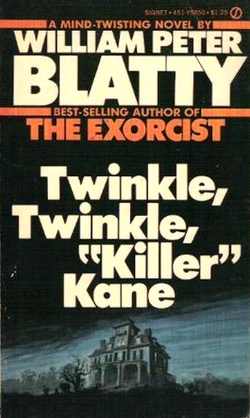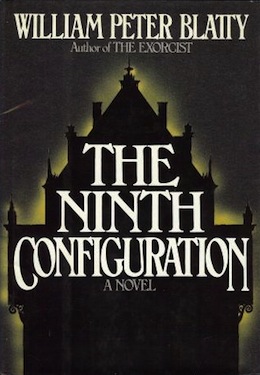Today’s bestsellers are tomorrow’s remainders and Forgotten Bestsellers will run for the next two weeks as a reminder that we were once all in a lather over books that people barely even remember anymore. Have we forgotten great works of literature? Or were these books never more than literary mayflies in the first place? What better time of year than the holiday season for us to remember that all flesh is dust and everything must die?
Hardly a bestseller, The Ninth Configuration is the first book blockbuster author William Peter Blatty published after the massive global success of his possession novel, The Exorcist. Most guys who write a bestselling novel about demonic possession, followed by an Academy-Award-winning adaptation of same, would follow up with the something similar, only different. Maybe this time the demon possesses a little boy instead of a little girl? Or a buffalo? But Blatty’s first book after the movie became an international phenomena was about the crisis of faith suffered by a minor character from The Exorcist. People came to The Exorcist for the pea soup vomit and the scares, but they tended to fast forward past the theological debates. Which makes it inexplicable that The Ninth Configuration is a book that’s almost nothing but those debates.
In 1966, Blatty wrote Twinkle, Twinkle, “Killer” Kane which was the kind of rambunctious military comedy the world expected from the guy who wrote the screenplay for the second Pink Panther movie. After The Exorcist, he rewrote it from scratch and published it in 1978 as The Ninth Configuration. Two years later, he would direct it as a trippy, surreal film that’s mostly forgotten but has acquired, very rightly, a devoted cult of fans. One part Catch-22 one part the boring bits from The Exorcist, there’s nothing else quite like it, and most people would peg it as career suicide.
In The Exorcist, young possessed Regan invades a post Georgetown dinner party her mom is having to pee on the carpet and tell an astronaut that he’s “going to die up there” which really puts a damper on things. That astronaut is Billy Cutshaw, whom we meet at the beginning of The Ninth Configuration, a man who recently suffered a philosophical panic attack on the launch pad and aborted his mission because he couldn’t bear the idea that he might die all alone in space and that there is no God, no nothing, beyond our planet but an endless void.
 Now he’s confined to Center Eighteen, a castle near the Washington Coast, donated to the government by Amy Biltmore and used as a secret mental institution for a rash of nervous breakdowns among high-ranking servicemen with impeccable records who all seem to have suddenly gone stark raving mad. Cutshaw is the leader of this merry crew, which includes Nammack, who believes he’s Superman, Fairbanks, who is desperate to adjust his atoms so he can walk through walls, and Reno, who’s planning to stage the complete works of Shakespeare with an all-dog cast. Everyone’s getting along just great until the arrival of the new psychiatrist and commanding officer, Colonel Kane. But rather than whip these merry pranksters into shape, Kane seems fascinated by their madness, convinced that they need to fulfill their delusional goals in order to have closure and be whole.
Now he’s confined to Center Eighteen, a castle near the Washington Coast, donated to the government by Amy Biltmore and used as a secret mental institution for a rash of nervous breakdowns among high-ranking servicemen with impeccable records who all seem to have suddenly gone stark raving mad. Cutshaw is the leader of this merry crew, which includes Nammack, who believes he’s Superman, Fairbanks, who is desperate to adjust his atoms so he can walk through walls, and Reno, who’s planning to stage the complete works of Shakespeare with an all-dog cast. Everyone’s getting along just great until the arrival of the new psychiatrist and commanding officer, Colonel Kane. But rather than whip these merry pranksters into shape, Kane seems fascinated by their madness, convinced that they need to fulfill their delusional goals in order to have closure and be whole.
As the castle descends into anarchy, Kane and Cutshaw engage in a duel of belief with Cutshaw claiming that he wants to believe in God but he’s never seen any evidence. Kane is a believer and he and Cutshaw decide that if they can find a human being acting out of kindness, and counter to their own self-interests, it will be proof enough that the universe contains goodness and, therefore, a God (I’m simplifying here). Then, chapter after chapter, Kane attempts to show a human being motivated by kindness while Cutshaw shoots down every example as being motivated, on some level, by self-interest.
Blatty viewed The Ninth Configuration as the sequel to The Exorcist, and he states that his three books (The Exorcist, The Ninth Configuration, and Legion) form a loose trilogy (as do the three film versions: The Exorcist, The Ninth Configuration, and The Exorcist III). His tolerance for long-winded theological debate is balanced by his ability to write dialogue like a dream, constantly pulling the rug out from under his high-minded characters with sharp comedy and surreal slapstick. At only 135 pages, the book moves fast, and never bogs down into navel-gazing twaddle, betraying Blatty’s origins as a screenwriter with an emphasis on dialogue and pace.
Always a better writer than he gets credit for, Blatty ends The Ninth Configuration with a moment of sacrifice that gives Cutshaw his one unselfish man, but then in its last pages it unfolds outwards to present a gallery of sacrifices, piling up example after example of people acting against their own self-interests for love, or folly, or for no good reason in particular. Even more fascinating is when the book takes place. Despite coming out seven years after Blatty wrote The Exorcist, it’s set in 1968 and so Cutshaw attends that Georgetown party and is told he’s going to die on a mission long after The Ninth Configuration has ended and he’s reconciled himself to a belief that man is not alone, even in the infinite void of space. I don’t think he has a single line in the film version of the book, but there’s something touching about the fact that Blatty wanted to give even one of his minor characters an inner life, full of hopes and dreams.
You can argue about the existence of God all you want, but for Blatty, human beings are the ultimate proof, his own duck-billed platypus. Would nature have designed a biological machine as ridiculous, as inefficient, as prone to stupidity as humanity? Or does our very existence suggest that there is some kind of God and that he or she has a wicked sense of humor? Since Blatty is the man who wrote the line, “Give me ten men like Clouseau and I could destroy the world.” It’s pretty easy to guess which side of the argument he comes down on.
Grady Hendrix has written for publications ranging from Playboy to World Literature Today and his latest novel is Horrorstör, about a haunted Ikea.










